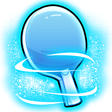Not watching the ball to contact point
Discussion
Video Answer

We have filmed a video response for this question. To watch it you need to be a free member. By becoming a free member you'll be able to learn techniques used by Olympic Coach Alois Rosario and Olympian Jeff Plumb.
Already have an account? Login now.
 Peter McGrail Asked 1 year ago
Peter McGrail Asked 1 year ago
As can be the case with golf, is it a very common fault in table tennis that people, especially beginners, do not concentrate to make sure they watch the ball all the way to contact point. I have this fault and really need to concentrate, it is worse when I am up against a better player, and my anxiety levels rise.
 Alois Rosario Answered 1 year ago
Alois Rosario Answered 1 year ago
Hi Peter,
It's absolutely correct that one of the common faults for beginners in table tennis is not watching the ball all the way to the point of contact. This issue isn't exclusive to novices, however; even more experienced players can sometimes lose focus on the ball during a rally, particularly under pressure. Keeping your eye on the ball until it makes contact with your bat is crucial for several reasons:
1. Helps with timing: Watching the ball allows you to better judge the speed and spin, which contributes to better stroke timing.
2. Improves accuracy: By following the ball, you are more likely to hit it on the sweet spot of the racket, resulting in a more accurate shot.
3. Spin adaptation: Particularly in table tennis, where spin plays a significant role, watching the ball closely helps you adapt your stroke to counter your opponent's spin.
Anxiety levels can indeed rise when playing against a better opponent. This tension can divert your focus away from the ball to other aspects of the game or cause you to become preoccupied with the outcome of each shot.
Here are some tips to help you concentrate on watching the ball: - Incorporate drills that emphasize ball tracking into your practice routine. One example is to have a practice partner vary spin and placement while you focus solely on contacting the ball with the correct timing and angle.
Learn and implement relaxation techniques such as deep breathing between points to manage anxiety and maintain focus during matches.
Sometimes, it helps to verbally remind yourself to 'watch the ball', or even to focus on a specific part of the ball (such as its logo) to train your eyes to follow it better.
Develop a pre-point routine that includes a mental cue to focus on the ball, which can help build the habit of keeping your eye on the ball during play.
Practice playing points against higher-level players in a controlled environment. This can help you get used to the pace and spin, and reduce anxiety during real matches.
Practice mindfulness and visualization exercises away from the table. Visualize yourself watching the ball all the way to the racket and executing a perfect stroke. This mental practice can help in actual play. Remember, it's a common challenge and it takes concerted effort to improve. Keep practicing, be patient with your progress, and gradually, keeping your eye on the ball will become second nature.
Recommended Video
Point of Contact on Stroke
Where should you aim to contact the ball on your stroke? Is it better to take the ball, early, late or at the top of the bounce?
Watch NowThoughts on this question
Become a free member to post a comment about this question.
Thanks Aloïs
Hi Alois, thanks for your sound advice in the video and response to Peter's question.
I advise players to consider this (amongst other things) during the 2 minute warm up before the start of each match i.e., getting them to 'warm up' their eye tracking movement/speed - watching the ball onto their bat then their opponent, onto their bat then their opponent etc.
Thanks again,
Kevin Edwards
(Table Tennis England level 3 coach)